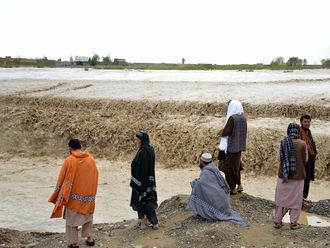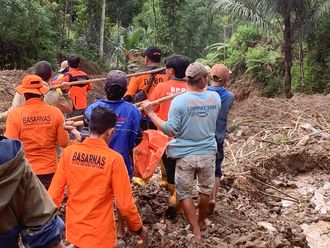WASHINGTON: The 11-tonne “mother of all bombs” dropped by US forces on Daesh-linked fighters in Afghanistan is a highly specialised weapon with a heritage dating back to huge bombs developed for use against Nazi targets in Second World War.
The 9,797-kg GBU-43 (Guided Bomb Unit), one of only 15 ever built, was developed after the US military found itself without the ordnance needed to deal with Al Qaida tunnel systems in the hunt for Osama Bin Laden in 2001.
But the Massive Ordnance Air Blast Bomb, or MOAB, as it is also known, had never been used in combat until a US MC-130 aircraft dropped one on the Achin district of Nangarhar, bordering Pakistan, on Thursday.
The US commander in Afghanistan said on Friday that the decision to use one of the biggest conventional bombs ever used in combat was purely tactical.
Experts said that while the use of the bomb was likely a technical decision of matching the most effective ordnance to a specific target — tunnels and caves in an unpopulated area — its shock waves would have been sent not only to Daesh fighters, but also to North Korea, which conceals its nuclear weapons program deep underground, and Iran, which has a large uranium enrichment facility buried in a granite mountain.
In addition, said an administration official who spoke on the condition of anonymity, the attack also reinforces the message that US President Donald Trump has given his military commanders freer rein than did his predecessor, Barack Obama.
“What I do is I authorise my military,” Trump told reporters on Thursday in response to a question about the use of the bomb.
“We have the greatest military in the world, and they’ve done the job, as usual. We have given them total authorisation, and that’s what they’re doing.”
The bombing came less than a week after Trump ordered the firing of 59 Tomahawk missiles at a Syrian airfield in response to a deadly nerve gas attack. That raised questions about his plans for North Korea, which has conducted missile and nuclear tests in defiance of UN and unilateral sanctions.
“Certainly there’s a signalling element as a by-product — possibly being a signal to Syria or North Korea; certainly there is a signal to Daesh that no matter how much you try to hide, no matter how deep you dig, we can still get you,” said Mark Cancian, a retired US Marine Corps colonel and ordnance specialist.
Cancian, an adviser at Washington’s Center for Strategic and International Studies think tank, said regular bombs were not able to destroy a tunnel and cave complex.
“You need something with a lot of concussion. It goes off slightly above ground, but it creates a tremendous blast wave that will go deep into a cave and around corners, which frustrate regular munitions.” Retired US Air Force General Dave Deptula, a former commander of the air operations Centre for Operation Enduring Freedom in Afghanistan in 2001, said the GBU-43 was developed to replace the 15,000-pound “Daisy Cutter” bomb he employed there.
The Daisy Cutter, which was first used to clear landing strips for helicopters in Vietnam, was employed partly for the psychological effect of its massive blast.
Deptula, Cancian and US military officials said the United States has an even larger bomb in its inventory — the 14,000kg GBU-57 Massive Ordnance Penetrator (MOP), which would be more effective against North Korea’s nuclear test site, given its ability to penetrate reinforced concrete and anti-blast steel doors.
Deptula said the MOAB was designed to create over-pressure to collapse caves and a blast effect over about a mile on soft-to medium ground. The MOB, which has never been employed in combat, was designed to penetrate deep and hardened targets.
The MOAB and the MOP owe their origins to massive “Tallboy” and “Grand Slam” bombs developed by the British in Second World War for use against Nazi targets such as V-1 and V-2 missile sites and the battleship Tirpitz.
Deptula said that while the decision to drop the MOAB appeared be tactical, he acknowledged the psychological side-effects.












